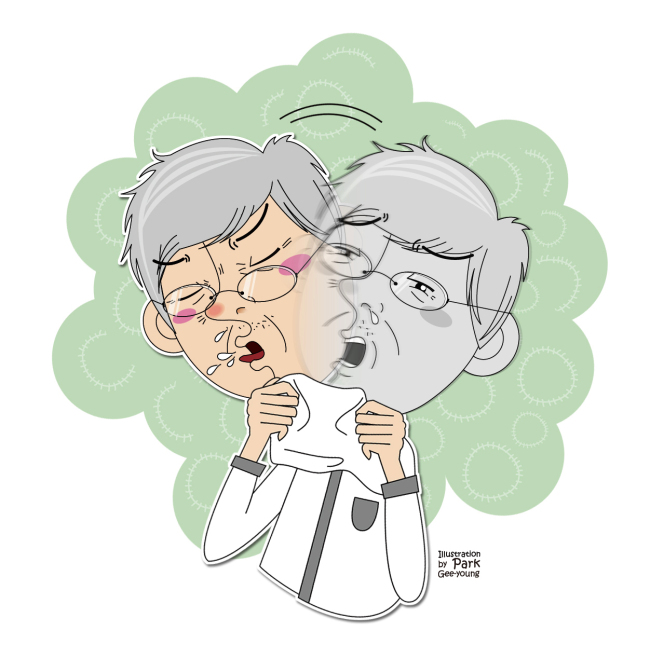
Diagnosis of chronic bronchitis is based on the criteria of coughing and sputum production for more than three months in a year for two consecutive years. Smokers who frequently have phlegm are included in these criteria.
Smoking is the most common cause of chronic bronchitis, but environmental pollution is another important cause, particularly due to worsening pollution. The increasing number of chronic bronchitis patients each year is thought to be also related to stress. Other contributing factors being blamed for repeated respiratory tract infections include genetic and work-related factors.
People with bad bronchi are very sensitive to changes in the climate, and feel chesty with a cough when the temperature falls or when the indoor humidity falls. Cold and dry air stimulate the bronchi to cause coughing, and when this persists, it leads to irritation of the bronchi and inflammation. Irritable bronchi are very painful for the patients with chronic bronchitis. They have an uncontrollable cough, which is worse at night, disturbing their sleep.
Our bodies are designed to respond to harmful external stimuli to protect ourselves. Coughing or sneezing is a reflex to remove dust that enters the nose or the trachea, which is similar to our blinking and tear production when dust enters the eyes, diarrhea caused by food gone bad, and goose bumps and hair raising when we feel cold. However, excessive activation of these usually helpful mechanisms can lead to painful symptoms.
Irritation of the bronchi is called bronchial hypersensitivity, and research shows an increasing number of nerves in the bronchi, which is seen to result in constriction with even the smallest of stimuli.
As for overcoming hypersensitivity of the bronchi, the causal agents must be removed. If smoking is the relevant cause, it is necessary to stop smoking. If cold and dry air are another cause, it helps to use air humidifiers during the night. In addition, if infection is the cause, appropriate antibiotics must be used. If an allergy is the cause, the allergens must be avoided. Symptomatic treatment without curing the causes will lead to recurrence of the condition, as well as risk damaging one’s health on account of the side effects of medication.
Acute bronchitis
This is an acute inflammation of the bronchial mucosa, caused by infections, bacteria and other hospital-acquired microorganisms such as mycoplasma, or by inhaling irritating gases.
There are hospital-acquired microorganisms that cause acute bronchitis, including H. influenzae virus, pneumococcal virus and occasionally, tuberculosis bacteria. Moreover, viral causes include influenza virus, rhinovirus, echovirus, adenovirus and herpes virus, and sometimes occur together with fungal infections.
Acute bronchitis is more liable to be contracted by children and the elderly, and those who used to have tuberculosis or pleural surgery are also at risk. The incidence of acute bronchitis increases with pandemic colds or influenza. Therefore, if you have fevers for more than two or three days with a continuing cough, you should see a doctor immediately.
The main symptoms of acute bronchitis include cough and fever in the early infection phase, and chest pain with coughing, together with spasms of the pharynx and edema, and dyspnea in progressed disease.
Failure to treat acute bronchitis in children can lead to bronchiolitis, and pneumonia as a complication. Pneumonia can then lead to fever, cough, dehydration, dyspnea and pleuritic chest pain.
The treatment of acute bronchitis varies with the causes and the symptoms. Viral or bacterial causes must be treated with selective use of antibiotics or antivirals depending on the pathogen, and antipyretics for fever. Those with bronchial obstruction and increasing sputum should use bronchial dilators, and a severe cough can be treated with antibechics (cough medicines). Other local anti-inflammatory agents can also be used.
Codeine-containing antibechics should be restricted to nighttime use.
Preventative measures
In order to prevent and recover from acute bronchitis quickly:
First, rest well and maintain good nutrition.
Second, increase fluid intake, and use air humidifiers to maintain adequate humidity. Clean the water tank of the humidifier thoroughly and use clean water. Make sure that it has not been contaminated with bacteria, fungi and dust.
Third, avoid smoking and secondhand smoke.
 |
|
Kim Ho-joong |
By Kim Ho-joong
The author is a doctor in the Division of Pulmonary and Critical Care Medicine at Samsung Medical Center and a professor of Sungkyunkwan University School of Medicine. ― Ed.